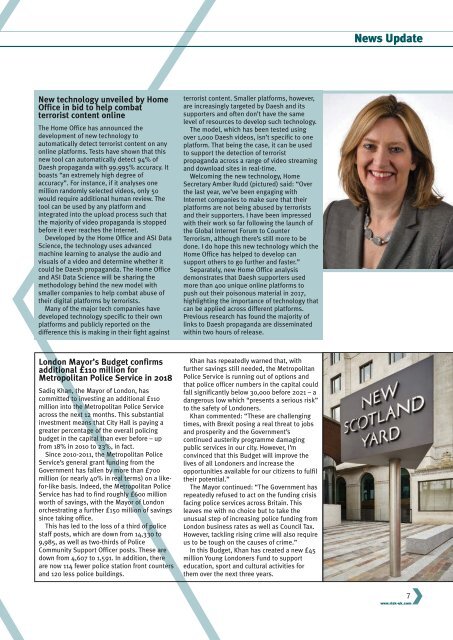RiskUKMarch2018
Create successful ePaper yourself
Turn your PDF publications into a flip-book with our unique Google optimized e-Paper software.
News Update<br />
New technology unveiled by Home<br />
Office in bid to help combat<br />
terrorist content online<br />
The Home Office has announced the<br />
development of new technology to<br />
automatically detect terrorist content on any<br />
online platforms. Tests have shown that this<br />
new tool can automatically detect 94% of<br />
Daesh propaganda with 99.995% accuracy. It<br />
boasts “an extremely high degree of<br />
accuracy”. For instance, if it analyses one<br />
million randomly selected videos, only 50<br />
would require additional human review. The<br />
tool can be used by any platform and<br />
integrated into the upload process such that<br />
the majority of video propaganda is stopped<br />
before it ever reaches the Internet.<br />
Developed by the Home Office and ASI Data<br />
Science, the technology uses advanced<br />
machine learning to analyse the audio and<br />
visuals of a video and determine whether it<br />
could be Daesh propaganda. The Home Office<br />
and ASI Data Science will be sharing the<br />
methodology behind the new model with<br />
smaller companies to help combat abuse of<br />
their digital platforms by terrorists.<br />
Many of the major tech companies have<br />
developed technology specific to their own<br />
platforms and publicly reported on the<br />
difference this is making in their fight against<br />
terrorist content. Smaller platforms, however,<br />
are increasingly targeted by Daesh and its<br />
supporters and often don’t have the same<br />
level of resources to develop such technology.<br />
The model, which has been tested using<br />
over 1,000 Daesh videos, isn’t specific to one<br />
platform. That being the case, it can be used<br />
to support the detection of terrorist<br />
propaganda across a range of video streaming<br />
and download sites in real-time.<br />
Welcoming the new technology, Home<br />
Secretary Amber Rudd (pictured) said: “Over<br />
the last year, we’ve been engaging with<br />
Internet companies to make sure that their<br />
platforms are not being abused by terrorists<br />
and their supporters. I have been impressed<br />
with their work so far following the launch of<br />
the Global Internet Forum to Counter<br />
Terrorism, although there’s still more to be<br />
done. I do hope this new technology which the<br />
Home Office has helped to develop can<br />
support others to go further and faster.”<br />
Separately, new Home Office analysis<br />
demonstrates that Daesh supporters used<br />
more than 400 unique online platforms to<br />
push out their poisonous material in 2017,<br />
highlighting the importance of technology that<br />
can be applied across different platforms.<br />
Previous research has found the majority of<br />
links to Daesh propaganda are disseminated<br />
within two hours of release.<br />
London Mayor’s Budget confirms<br />
additional £110 million for<br />
Metropolitan Police Service in 2018<br />
Sadiq Khan, the Mayor of London, has<br />
committed to investing an additional £110<br />
million into the Metropolitan Police Service<br />
across the next 12 months. This substantial<br />
investment means that City Hall is paying a<br />
greater percentage of the overall policing<br />
budget in the capital than ever before – up<br />
from 18% in 2010 to 23%, in fact.<br />
Since 2010-2011, the Metropolitan Police<br />
Service’s general grant funding from the<br />
Government has fallen by more than £700<br />
million (or nearly 40% in real terms) on a likefor-like<br />
basis. Indeed, the Metropolitan Police<br />
Service has had to find roughly £600 million<br />
worth of savings, with the Mayor of London<br />
orchestrating a further £150 million of savings<br />
since taking office.<br />
This has led to the loss of a third of police<br />
staff posts, which are down from 14,330 to<br />
9,985, as well as two-thirds of Police<br />
Community Support Officer posts. These are<br />
down from 4,607 to 1,591. In addition, there<br />
are now 114 fewer police station front counters<br />
and 120 less police buildings.<br />
Khan has repeatedly warned that, with<br />
further savings still needed, the Metropolitan<br />
Police Service is running out of options and<br />
that police officer numbers in the capital could<br />
fall significantly below 30,000 before 2021 – a<br />
dangerous low which “presents a serious risk”<br />
to the safety of Londoners.<br />
Khan commented: “These are challenging<br />
times, with Brexit posing a real threat to jobs<br />
and prosperity and the Government’s<br />
continued austerity programme damaging<br />
public services in our city. However, I’m<br />
convinced that this Budget will improve the<br />
lives of all Londoners and increase the<br />
opportunities available for our citizens to fulfil<br />
their potential.”<br />
The Mayor continued: “The Government has<br />
repeatedly refused to act on the funding crisis<br />
facing police services across Britain. This<br />
leaves me with no choice but to take the<br />
unusual step of increasing police funding from<br />
London business rates as well as Council Tax.<br />
However, tackling rising crime will also require<br />
us to be tough on the causes of crime.”<br />
In this Budget, Khan has created a new £45<br />
million Young Londoners Fund to support<br />
education, sport and cultural activities for<br />
them over the next three years.<br />
7<br />
www.risk-uk.com

















